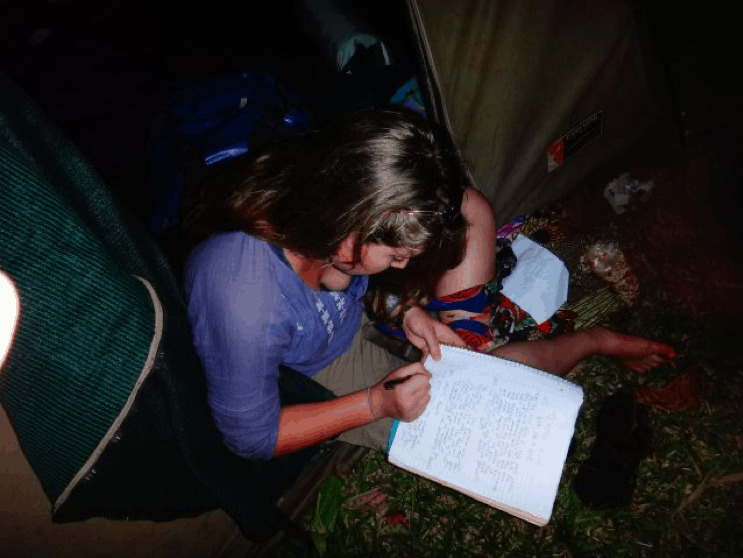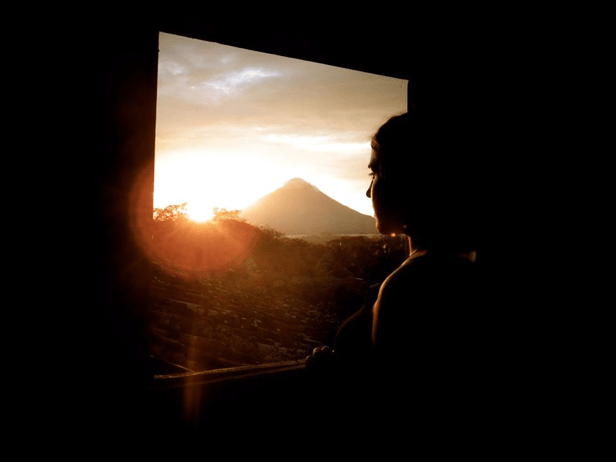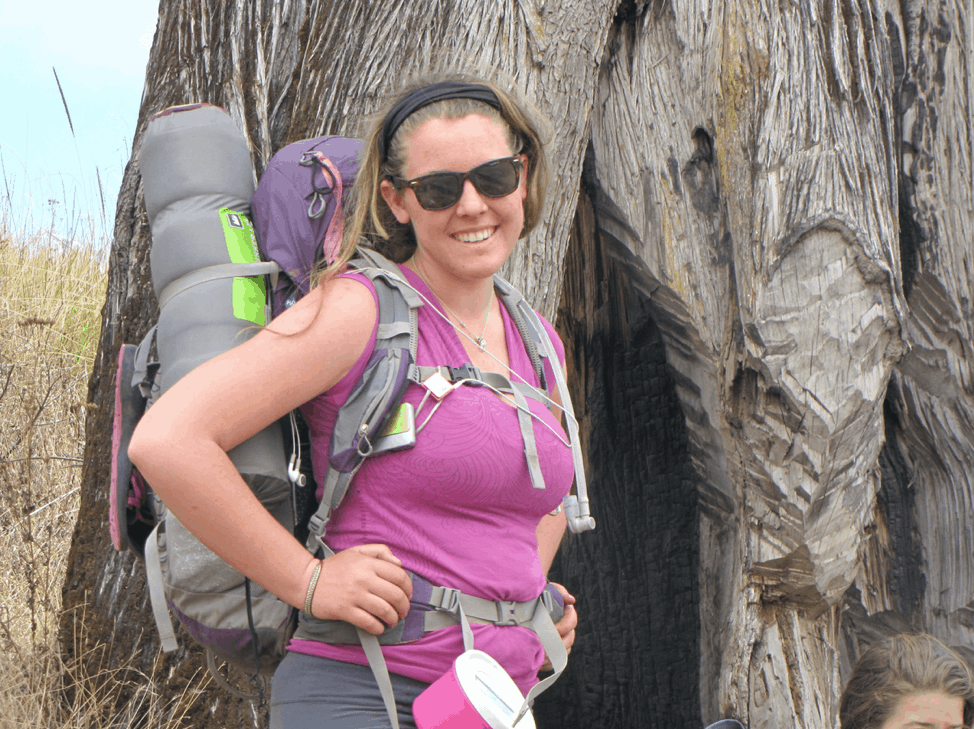An Interview with Alumna Abby Wilson

TTS: What are you doing now and what are some of the highlights or accomplishments you are most proud of?
AW: Since graduating from the George Washington University in Washington, DC with a degree in international affairs and public health in May 2018, I have continued my work in community health epidemiology and grassroots social change as a program director at a large health care organization (FQHC) called Mary’s Center. Mary’s Center was started in 1988 after a high need for culturally competent prenatal care and family services was identified, specifically in Latnix migrant communities. Many women actively fled ethnic and gender-based violence and persecution in Central America in the eighties and nineties. Of those who made it to DC, many were separated from their children and families and/or became impregnated on their journey northward. Upon arriving in a place that was devoid of familiar support structures and channels to care, birth outcomes in this population were remarkably poor. From the beginning, Mary’s Center has focused on delivering multilingual, culturally competent, trauma-informed care regardless of ability to pay. As a DC Medicaid program director at MC, my work supports the greater mission of our social change model, marrying intergenerational education, primary medical/behavioral/dental care, and social services into one social determinants of health focused delivery model. My program utilizes social determinants of health assessments and case management relationships to improve the wellbeing of those with three or more chronic conditions. As a 23-year-old, I am in a position in my organization that makes me quite aware, and others often unaware, of my age. I find power in this and great humility and appreciation for the strong foundations and teachers whose voices echo within every time I doubt speaking up, doubt being understood, or doubt fighting for unpopular change.
TTS: How did your TTS experience influence what you are doing today and who you are today?
AW: Without my year in TTS I likely would have taken a conventional clinical approach to my health care education. Armored with the value of cultural competency, I instead pursued a degree and career path that invests in the perspectives and experiences of our most marginalized and vulnerable populations. Wagering those invaluable insights, Public Health professionals seek to ignite durable large-scale social and systems change by investing in one life at a time and addressing all the challenges and barriers to wellbeing experienced in that life. Ultimately, this work exposes just how integrated our communities, our struggles, and our triumphs truly are. Sounds pretty TTS to me!

TTS: Tell us about something that you gained from your TTS semester that you still carry with you today.
AW: Listening, collaborating and engaging on a one-to-one level with the participants I serve professionally is a ritual I have trained for every day since landing in Livingstone, Zambia, in late August 2012. This moment began what would become a year of immense and challenging self-discovery and self-disinvestment. Being able to value myself and my skills while simultaneously acknowledging my privilege and the facets of my identity that make my lived experience relatively enfranchised in this country is a journey that I know began in TTS. I foresee this commitment to understanding my power and the power of my community as being lifelong, the ripest fruits of my labor both in my professional and personal life will come from my ability to hear, see, empathize and act. For all of this, I credit The Traveling School.
TTS: Why is TTS important for high school girls?
AW: The Traveling School has to this day been the most condensed period of rapid evolution and learning in my life. It is empowering to navigate environments that make you uncomfortable and to unpackage that discomfort. It is empowering to be thousands of miles away from your high school and home and to feel homesick, to miss what you didn’t know to miss before. It is empowering to be othered, to be hyper-visible, to struggle to communicate. It is empowering to reconcile our own values as young women with the values that are baked into our minds by our childhood environments. Ultimately, if you’re not questioning almost everything about what makes our world move at 16, you’re not using what are some of the most formative years of your life to better yourself and prepare to better the world around you. Before I left for TTS I was worried my friends would forget about me, that I wouldn’t have a date to prom, that I would miss so many sacred high school routines that I would become socially irrelevant upon return. Nine months later, as I surfaced from a Caribbean lagoon 50 miles off the coast of Nicaragua bathed in starlight and the warm glow of a full moon, just having finished my first night dive to complete my Advanced PADI dive certification, I laughed. I looked down through the crystalline water and could see sparkling threads of bioluminescence trace between my toes as I floated and gazed. It was the night of my junior prom, which I wouldn’t realize for months because simply put I didn’t and couldn’t care. TTS expanded me, it dissected and put me back together, I would not be the woman I am seven years later if not for The Traveling School. It’s not easy, but nothing that’s been easy in my life has been fruitful.

TTS: What current issues are you most passionate about and what are you doing to make an impact/change in your community?
AW: I’m big on empathy. My whole life I’ve been deeply intuitive and sensitive to those around me, their moods, their energy, what would potentially ease or agitate a situation further. This is what channeled me into public health and later what piqued my interest in trauma-informed care. Unsurprisingly, studying cultural competency is a lot different than providing services to populations that are limitlessly diverse in practice. After recognizing this gap in my practical skills, I began training in trauma-informed care practices. Working in a space where systematic and individualized trauma is so prevalent has made it painfully obvious that I cannot provide high quality culturally competent care if I do not establish safety, trust, and transparency before committing myself to collaborative empowerment and activism. TIC asks us to relinquish the attitudes and belief systems that the hierarchies, bureaucracies and pressures of conforming to ‘rightness’ and perfection tell us to keep clenched tightly to our chests. I work in healthcare, so the application may be more obvious, but I think valuing and developing emotional intelligence in all spaces can improve life in all spaces. Daily, I am overwhelmed by the differences between myself and those I serve. I consistently doubt my expertise, my capacity to understand and my ability to help. But this just allows me to openly learn…to embrace uncomfortable moments as opportunities to expand my understanding of my community and my world. These are the moments I am passionate about.
TTS: What is a #hashtag that embodies this or embodies how you feel about TTS?
AW: I don’t really have a profound hashtag, but this is a sentiment I think is important:
The ideas that will save our generation, our children’s generation, are not coming from people who don’t challenge themselves and others. Being unapologetically uncool and dissecting my strengths and the environment that permits my strengths to exist is what I care about. I’m an undeniable maximalist. I will do too much ‘til the day I go over the rainbow bridge. I am pushy, I am demanding, I am challenging, I am self-centered, I am unconventional, I am a real piece of work. But am I supposed to be done workshopping who I am at 23? Are we ever done? Being better takes work and ongoing learning and unlearning and relearning. If we don’t risk being uncool or wrong or unpopular we will never know what could have been better, more universal, more inclusive.
But also check out #babyreptiles because they are very cute and that is important too!

TTS: What are you passionate about?
AW: The stuff I’m most passionate about is culturally competent sex education, healthy sex communication, trauma informed care, community building, etc. I wanted that to be the sole focus of my early career but found that I couldn’t do that work any justice at the community level without working alongside racial equity. As part of my job I work on our Inclusion, Diversity, Equity, and Awareness (IDEA) committee where I am a founding member of our Racial Equity Subcommittee. I care about enfranchising white folks into racial equity work in a meaningful and purposeful way.

